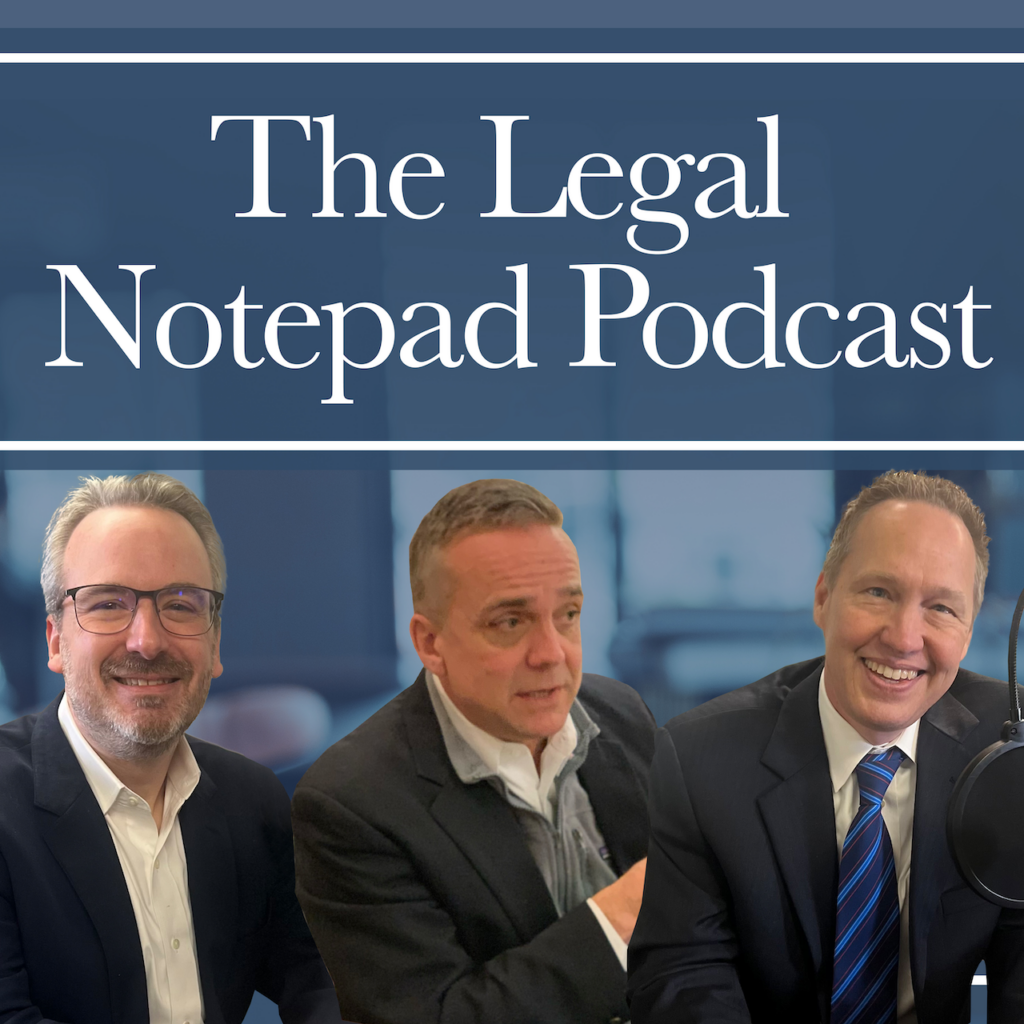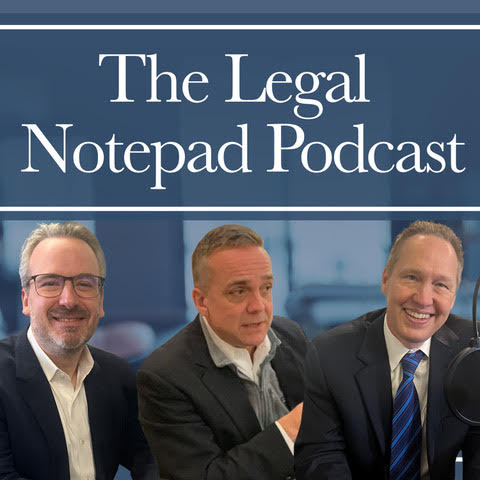Episode 7: Louisville attorneys Rob Mattingly and Kevin C. Burke discuss the history of the Collateral Source Rule and the Kentucky Supreme Court decided to Kentucky will follow this particular rule. They’re joined by Rob’s paralegal, Lauren Hincks, who helped research some of the information for today’s topic.
The discussion references the following case: O’Bryan vs. Hedgespeth
Editor’s Note: If you are an attorney and would like CLE credit for this episode, visit the Kentucky Justice Association website, click the Education and Training tab and look for the podcast.

Kevin begins the discussion by stating this is one of the seminal cases for plaintiff’s attorneys, whenever medical expenses are at issue. It’s a 1995 Kentucky Supreme Court opinion. However, attention should be given to where it started in 1988, with Kentucky House Bill 551. The resulting statute is KRS 411.188 requiring admission at trial of collateral sources.
What Are Examples of Collateral Sources?
Rob mentions a very common one is the mentioning, at trial, of health insurance that might have paid some of the medical expenses. Another example could involve short-term or long-term disability benefits that were received.
Collateral sources are typically benefits the plaintiff paid for or earned, so the question is should this evidence be admissible at trial?
Historically, Kentucky law did not consider this type of evidence admissible. The legislature attempted to change that in 1988. As a result, a judge has no discretion and they jury must hear about the collateral sources (regardless of the relevancy).
Edwards vs. Land actually went up before the O’Bryan case and is referenced in the O’Bryan opinion. It was heard before the Kentucky Court of Appeals. The opinion validated the actions of the Kentucky Legislature.
A Common Misconception Regarding Discretionary Review
Rob points out that the Kentucky Supreme Court did not review Edwards. Kevin clarifies a misunderstanding in appellate practice regarding the Court’s denial of discretionary review. Just because the Court chooses not to review Court of Appeals opinion, does not necessarily mean that the Supreme Court agrees with the Court of Appeals. This particular issue is included in O’Bryan.
O’Bryan vs. Hedgespeth and the Motion in Limine Rule
The plaintiff in the case filed a motion in limine to exclude collateral sources. The defendant argues the statue should be followed. The court agreed with the defendant. The plaintiff now must decide whether to bring up in voir dire or to wait to let defense bring it up. If the plaintiff brings it up, have they waived the remedy on appeal?
In O’Bryan, the Supreme Court said the plaintiff didn’t waive the remedy. The plaintiff is not required to wait.
Rob view this through the lens of fairness. If you filed a motion in limine and the court denied it, then it should be fair that you have the opportunity to bring it up, first, without having to wait. Kevin agrees. However, he advises attorneys to make sure they have a ruling on the record.
The Constitutional Phase
The plaintiff made several arguments as to why 411.188 was unconstitutional.
The first argument involved Section 51, the Subject Title Clause. In essence, if you have a title for a Bill and the subject doesn’t relate to the title, it’s a problem. Kevin explains how Kentucky’s Constitution was designed to limit the General Assembly’s power to engage in shenanigans. The Court found that there was not a violation of Section 51. However, it left the door open as to whether other topics not related to collateral sources, would satisfy Section 51.
The next issue dealt with separation of powers. Kevin remarks how Kentucky’s approach to this issue created some of the strongest provisions of any state constitutions. Sections 27, 28 and 116 focus on the separation of powers. The Court reviewed whether the Kentucky Legislature telling the courts they needed to allow collateral sources actually violated the separation of powers. Section 116 was of particular interest, because it grants exclusive authority to the courts, including the Kentucky rules of evidence.
Rob comments about the historical issue regarding the understanding of where one branch’s power ends and the others begin.
The Court found that 411.188 Subsection 3 actually does violate the separation of powers.
The Court also addressed the doctrine of comity. This doctrine says the Kentucky Supreme Court can, under certain circumstances, give deference to the Legislature, even though it might violate the separation of powers (in this instance). The Court found that the information was irrelevant. It doesn’t address harm, fault or damages. Thus, it decided not to give comity to the Legislature.
Next, the Court also analyzed the issue of jural rights granted to our citizens (predating our state Constitution). It found that there would be a substantive limiting the rights of an injured person to fully recover. This, in and of itself, would violate the Kentucky Constitution. Jural rights are address in Sections 14, 54 and 241.
The Concept of Personal Responsibility
Rob discusses personal responsibility as it relates to the Collateral Source Rule. If an individual takes steps to purchase or earn certain benefits, should he/she have a penalty for having purchased or earned them, when compared to some who didn’t take steps and yet avoids the penalty? The Court agreed with this position.
Kevin juxtaposes this position by explaining that the wrongdoer shouldn’t receive a benefit because the injured party had the foresight to obtain insurance.
Rob goes back to O’Bryan in which the term “windfall” was used by the Court as it described a lack of accountability that the person responsible for the harm caused would receive. This binds the issues of personal responsibility and accountability together.
Kevin explains how Justice Leibson addressed the reason the Rule doesn’t work in practice. The section on comity mentions that the Court shouldn’t give comity to the Legislature because of the complexity it would introduce into the issue of insurance, notwithstanding the issues of impracticability and relevancy.
Justice Leibson also commented on how evidence given to the jury could potentially result in a reduction of the amount of the award. Kevin and Rob use and example wherein if the jury were to only award the out of pocket expenses, the health insurance carrier could then use subrogation to exert rights to the amount of the reduced award; leaving the plaintiff with nothing.
Rob brings up the point that if you were able to tell the jury about the health insurance, short-term or long-term insurance, you would still be precluded from mentioning auto insurance, because of other rules of evidence. This creates a question of balance regarding insurance as a whole. Again, it would be impracticable.
Kevin notes how Justice Leibson also addressed the above by noting the jury would only receive a limited and skewed view into what’s actually going on.
Baptist Healthcare vs. Miller 177 S.W.3d 676
This is a 2005 Kentucky Supreme Court Opinion. Kevin and Rob explain how the Court reaffirmed the Collateral Source Rule from O’Bryan in this opinion. Baptist involved an issue related to Medicare.
In closing, Rob comments on how the Kentucky Constitution protects against a violation of the Collateral Source Rule.
That’s a wrap on today’s discussion. We hope you found the discussion insightful. As always, we encourage you to share this episode with your colleagues.
If you’d like the case notes, please sent us an email request and we’ll be happy to email you the file including the cases, rules, etc.
You can follow our podcast on a variety of platforms including, Spotify, iHeartRadio, Amazon Music, Audible, Apple Podcasts and many more. Thanks for taking the time to listen.
For more information about the Law Offices of DeCamillis and Mattingly, PLLC
Address: 138 S. Third Street, Louisville, KY 40202 (across from The Old Spaghetti Factory)
Phone: (502) 589-2822
Website: DeCamillisMattingly.com
To Contact Kevin Burke:
Website: BurkeNeal.com
Phone: (502) 709-9975
The Kentucky Bar Association Requires Us to State “This is an advertisement.”



